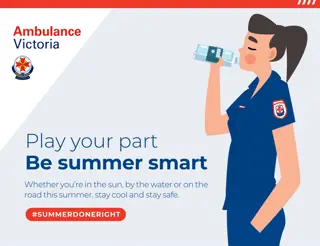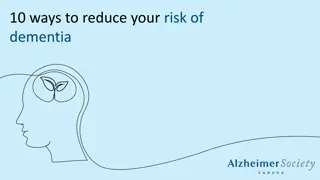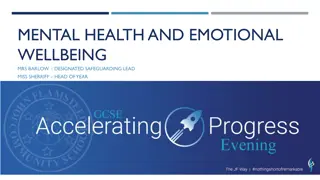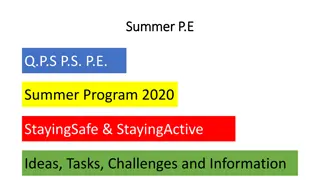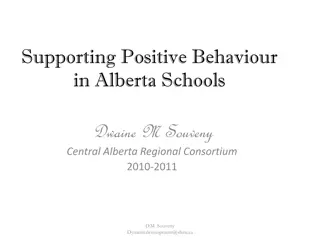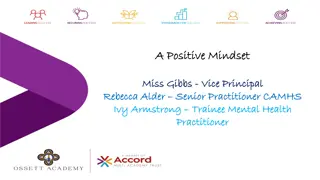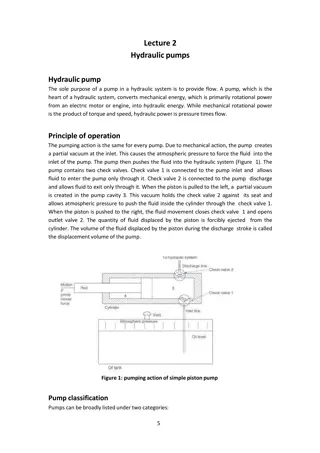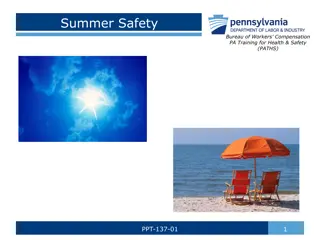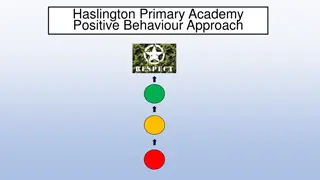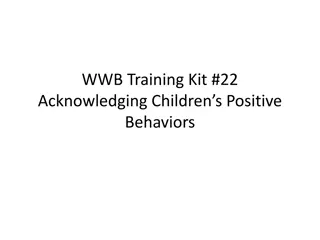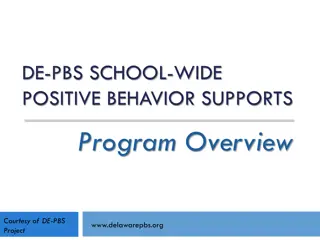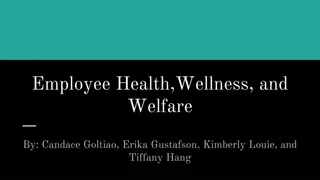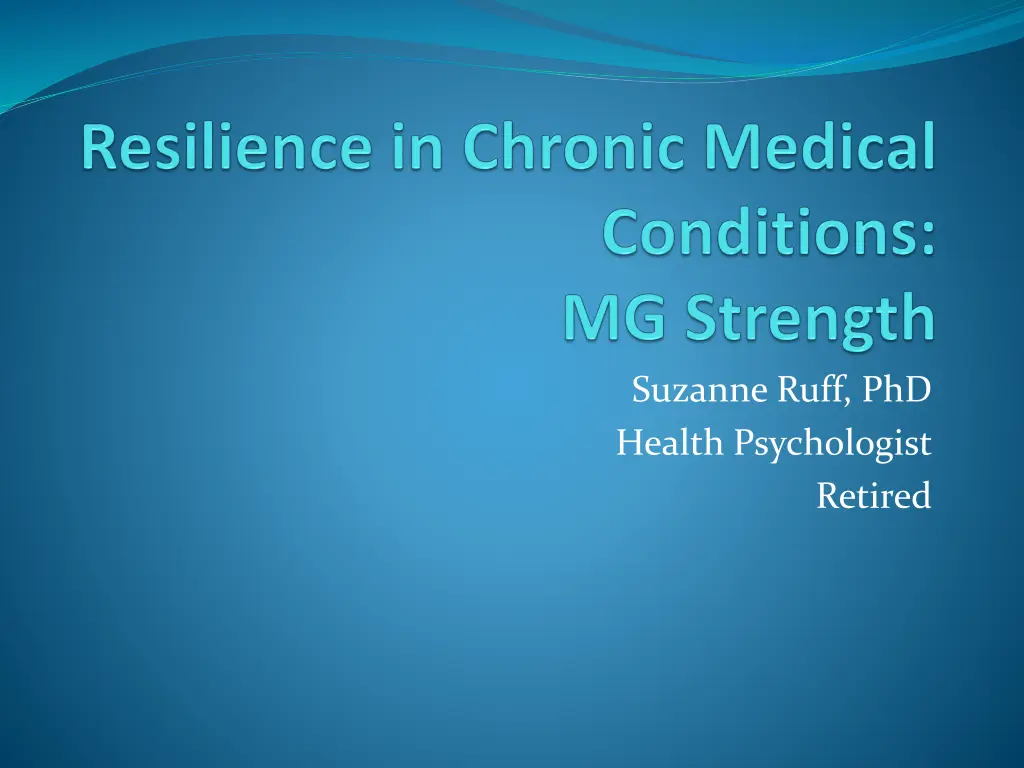
Managing Emotional Changes in Chronic Medical Conditions
Learn how to manage emotional changes associated with chronic medical conditions like Myasthenia Gravis (MG). Understand the stages of emotional response, care for your condition, seek support, and strive to return to your pre-diagnosis life. Partner with caregivers, family, and friends for comprehensive support.
Uploaded on | 0 Views
Download Presentation

Please find below an Image/Link to download the presentation.
The content on the website is provided AS IS for your information and personal use only. It may not be sold, licensed, or shared on other websites without obtaining consent from the author. If you encounter any issues during the download, it is possible that the publisher has removed the file from their server.
You are allowed to download the files provided on this website for personal or commercial use, subject to the condition that they are used lawfully. All files are the property of their respective owners.
The content on the website is provided AS IS for your information and personal use only. It may not be sold, licensed, or shared on other websites without obtaining consent from the author.
E N D
Presentation Transcript
Suzanne Ruff, PhD Health Psychologist Retired
Chronic Medical Condition of MG You have three important tasks in managing the chronic medical condition of Myasthenia Gravis Care for your condition, learn about your condition Manage any emotional changes that your condition may bring about Return to your pre-diagnosis life as fully as possible Partner with your medical caregivers and your family and friends
Caring for your MG Learn as much as you can from trusted sources MG Ohio website Medical websites such as NIH, Cleveland Clinic, Mayo Clinic Support Groups Conferences Care for yourself Never forget that you are still you! A return to your life pre-diagnosis will include some changes and can be challenging but well worth the effort you and your caring circle will put in
Managing emotional changes Individuals react differently Everyone is unique, and many factors combine to produce a reaction to having a chronic condition Temperament, personality, memories of past experiences Resources available social support, finances, work, etc Unhelpful approaches Denial of symptoms or their meaning Poor adherence to medical treatment Negative coping practices Others ..
Emotional changes in different stages of diagnosis Pre-diagnosis Worry or anxiety Signs and symptoms may not be recognized You may begin to second guess yourself especially in a condition with varying symptoms Anger or sadness You can t do what you used to do You want your life back
Emotional changes in different stages of diagnosis Diagnosis Relief It s not in my head but this is a serious disorder Worry or anxiety Can be heightened especially with a serious condition Diagnosis known, but progression is uncertain Anger Why me? Depressed mood Later in time But, not inevitable
Emotional changes in different stages of diagnosis After diagnosis, mood can vary with: acuity of disease support available medical care available finances pre-diagnosis mood Resilience the ability to withstand or recover from difficulties Being resilient does not make you immune to having difficulties, but rather helps you to heal more quickly and more fully
Psychology of chronic illness What does this diagnosis mean to a person and their family or support network? Chronic medical conditions can lead to depressed mood or clinical depression Can go unrecognized Overlap of symptoms No single feature is always present in depression Most common is anhedonia lack of interest, pleasure or joy, not a sad mood Lack of restorative sleep, daytime fatigue Cognitive changes
Sadness, grief, depressed mood, depression Sadness and grief occur during everyone s lifetime Almost everyone experiences a depressed mood during their lives People with chronic medical conditions MAY Experience more frequent episodes of a depressed mood Experience more depth of a depressed mood Take longer to recover from a depressed mood There is a slightly higher (less than 10%) occurrence of clinical depression in persons with chronic medical conditions
Sadness and grief Sadness is a fairly common emotion and is usually short-lived. The cause can be identified and self- esteem is not affected. Grief is a response to a loss. Emotions can come in waves and again, the cause is usually identifiable and self-esteem is not affected. BUT Grief and depression can co-exist, complicating the picture
Clinical depression Symptoms Loss of pleasure in things previously enjoyed Loss of interest in others, activities, work, appearance Feelings of worthlessness or guilt (unwarranted) Difficulty concentrating, thinking, making decisions Physical symptoms Decreased or increased appetite, changes in sleep patterns, lack of energy or fatigue Thoughts of suicide New Suicide and Crisis Hotline: 988
Diagnosis and treatment Symptoms present for at least two weeks and significant enough to have an impact on relationships, work, other areas of life Mood, physical symptoms, cognitive (mental or thinking) symptoms Anhedonia lack of interest or pleasure Relationships Activities Meaning and purpose in life Seek responsible treatment Partner with your medical providers Think about therapy rather than medications
Worry, Anxiety and Stress There is a difference between worry, anxiety, and stress Worry can be met with problem solving You can name the problem No physical symptoms (headache, shaking hands, stomach upset) Anxiety is a fear that isn t named (what s happening??) Problem solving is not a good option because there s too much emotion interfering with thinking (like a snow globe that s been shaken) Deep breathing or another calming activity is called for Stress is a combination of both worry and anxiety You know the problem but don t know how to solve it There is also physical arousal in stress
Positive Psychology Martin Seligman, PhD, University of Pennsylvania founded the field of Positive Psychology in the late 1990 s Define happiness essentially a sense of well-being Not hedonism, not about material things Must be measurable and changeable Deconstructed the unwieldy term of happiness into: Positive emotion Purpose Engagement Positive relationships Positive accomplishments
Positive Psychology Positive emotion Broaden and build theory Barbara Fredrickson, PhD Broaden Positive emotions lead to more flexible thinking Positive emotions lead to more expansive vision Positive emotions lead to more creative thinking Build Positive emotions build stronger relationships Positive emotions build emotional reserves Positive emotions build future protection
Positive Psychology Increase positive emotions and decrease negative emotions Gratitude journal Develop new interests Deepen current interests Mindfulness focusing on the present Savor positive events, conversations, activities Distraction when negative thoughts occur Defuse negative landmines
Positive Psychology Purpose and engagement Positive character traits Panel formed to look for universal character strengths Ubiquitous character strengths What enables a community or culture to survive and flourish? Read philosophical, religious, and historical works Six meta traits Wisdom Humanity Courage Temperance Justice Transcendence
Positive Psychology Authentichappiness.org Take the VIA test long version FREE! Your top 5 strengths WISDOM - Love of learning, perspective HUMANITY - Love, kindness COURAGE - Persistence, vitality TEMPERANCE Prudence, self-regulation JUSTICE Leadership, fairness TRANSCENDENCE Humor, spirituality
Positive Psychology Bloom where you re planted or increase the Big Five The Big Five associated with good physical and mental health Gratitude Curiosity Hope/optimism Appreciation of beauty and excellence Vitality - zest Jumped categories from transcendence to courage
Positive Psychology How to become depressed Dwell on the negative Lose interest in most things and people Become convinced that negative things are permanent, pervasive, and not under your control Lose your sense of wonder Stop caring Compare these to the Big Five
Resilience Bouncing back after a difficult time Toughness, grit, spirit, strength Both a process and an outcome it s getting past the difficult time and arriving at a better place Factors that affect resilience Ways of seeing and engaging with the world Optimism, hope, realistic personal control Availability of social resources Family, friends, religious leaders, peers Ways of coping with difficulties
Resilience and Strengths Character traits and emotions Hope, optimism, gratitude Engaging with the world Activities that use strengths Activities that are absorbing Relationships Extremely important Parents, trusted adults, peers Meaning or Purpose Something bigger than oneself Accomplishment
12 Tips to increase Resilience Grow your gratitude Get together Cut yourself some slack Have a hassle free zone Stick to the program Take care of yourself Take control Express yourself Help somebody 1. 2. 3. 4. 5. 6. 7. 8. 9. 10. Put things in perspective 11. Turn it off 12. Live your values
Tip 1 Grow your gratitude Keep a gratitude journal Record 3 unique things each night for which you re grateful Think about what you re going to record during the day Dig deep think broadly Small treasures count! Start an email sharing chain Savor the good times Remember good times in detail Share with someone Remember that positive emotions leads to more flexible, creative and expansive thinking better problem solving ability
Tip 2 Get together Connections are crucial Family, friends, neighbors, work force, religious leaders, others with MG Support comes in many forms Practical support e.g., a ride when needed Emotional support Distraction fun stuff! Learn to accept help Do not worry alone! Remember that stronger relationships lead to better support networks
Tip 2, continued It s important to develop and keep connections Be available, be approachable Be kind (not just nice) Some powerful phrases I m here for you I need help I m listening I don t know ( I ll find out or do you know?) I m sorry You re important to me
Tip 3 Cut yourself some slack Assigning responsibility: negative things happen to everyone because of what you did or didn t do, what someone else did or didn t do, and sometimes even just plain bad luck! How would you respond if someone else was facing your challenges? We re usually easier on others than on ourselves Magic phrase: What would you do next time? What should you have done casts blame What will you do locks you into a position that might not be right under different circumstances Would suggests a future with a different outcome that gives you more control
Tips 4 and 5 Have a hassle free zone This could be a place in the home or at an outdoor space Time spent here is relatively short, but important It s important to have some free time away from demands, stresses Hassles (small inconviences) add up Stick to the program A routine is important more so for some than others but always important in challenging times Home can be a refuge in that sense Family/friends meals, weekly get togethers Remember when we always What are your traditions?
Tip 6 Take care of yourself Mentally, emotionally, physically, spiritually Challenges and fun are both important Stress has been a part of our lives for the past 2+ years in a unique way Remember the difference between worry, anxiety, and stress because coping skills can be geared to each Worry if you name the problem, you can problem solve Anxiety is a fear that isn t named Support from family and friends is helpful Relaxation skills, such as deep breathing, are needed to lessen physical symptoms Stress is a combination of both worry and anxiety You know the problem but don t know how to solve it Coping strategies are a big part of resilience building
Tip 6, continued Physically caring for yourself is necessary it is a crucial responsibility to yourself Eating right, being active, avoiding heat, etc SLEEP One of the biggest challenges Electronic devices impair sleep more than anything else for most people Blue light alerts the brain Those with daytime fatigue need to sleep more than others
Tip 7 Take control The Serenity Prayer says it all God grant me the serenity to accept the things I cannot change The courage to change the things I can And the wisdom to know the difference Controlling what you can lead to a sense of calm and a sense of power Accepting what you cannot control lessens stress and also leads to a sense of calm, and energy can be directed to other things
Tips 8 and 9 Express yourself Tip 2 describes the important of social connections to work through difficult or challenging times Sometimes that is just too hard or not possible Keeping a journal can help we think differently when we write Art, music, dance Help someone Helping others is a wonderful way to increase our own sense of worth We can also learn that others need us and it helps to develop empathy We can better put our problems in perspective
Tip 10 Put things into perspective Don t let the perfect be the enemy of the good. Enough is sometimes enough .. Looking at challenges from a different point of view is helpful Talk to someone about an issue, listen to their perspective It s common to think of problems as: Worse than they truly are, affecting many or all parts of their lives, long lasting, and because of something you did or didn t do Blaming yourself can be at a less than conscious level, but still have a big impact Or, you may place blame on others which may or may not be true but this takes away your control It helps to think about responsibility rather than blame Another magic phrase: I can t do that .YET
Tip 11 Turn it off Social media feeds can be toxic Doonesbury cartoon - Facebook is for misinformation and anger Instagram is for envy TikTok is for showing off Twitter is for snark and self-promotion News feeds are usually negative, sensationalistic Reading something once for information is good After that, repetition can be overwhelming or numbing Email Reading is efficient but quite different than conversing Tone, inflection, emphasis, facial expression, eye contact are lost Content would you say it to someone if they were present?
Tip 12 Live your values Identify your values How are you actually spending your time? How would you like to spend your time? Target areas for change What is balanced? Keep those in place What is necessary? Be realistic Plan for change Incremental or large changes? which do you prefer? Maintaining changes is important (and can be a challenge)
Thank you! Questions?


